
Myth: ADHD is not a real medical disorder
Attention-deficit hyperactivity disorder (also known as attention-deficit disorder) is in fact a legitimate medical disorder that impacts roughly 10 percent of kids and nearly six percent of adults in the United States. It’s been recognized by the American Psychiatric Association’s Diagnostic and Statistical Manual of Mental Disorders (DSM-5), which is the handbook or “mental health bible” of psychiatric disorders used by mental health clinicians. Several other major organizations, including the American Medical Association, the Centers for Disease Control and Prevention, the National Institutes of Health, and the U.S. Department of Education say ADHD is legit, too, says David W. Goodman, MD, assistant professor of psychiatry and behavioral sciences at the Johns Hopkins University School of Medicine and director of the Adult Attention Deficit Disorder Center of Maryland in Lutherville.
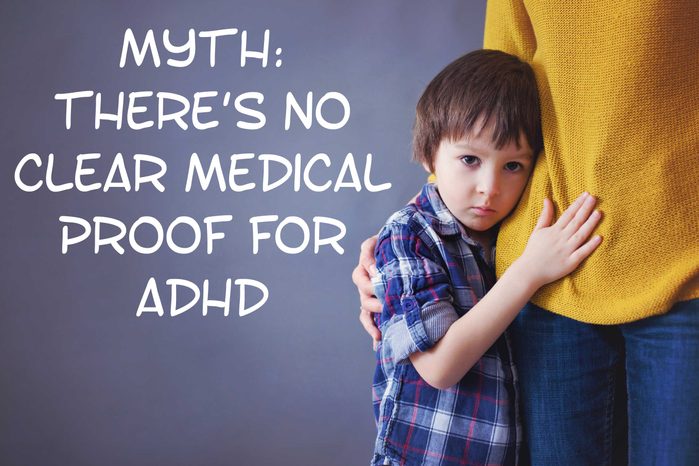
Myth: There’s no clear medical proof for ADHD
“This has been the theme of anti-psychiatry for decades,” Dr. Goodman says. This is because there are no objective medical or laboratory tests or scans to make an ADHD diagnosis. An ADHD diagnosis is based on clinical symptoms and the presentation of those symptoms overtime. These are silent signs of ADHD in adults that are easy to overlook. But that’s also true for other psychiatric and medical disorders; for example, there’s no objective test for migraine headaches—“and yet no one is running around saying chronic migraine headaches are not a medical disorder,” he says. As far as proof goes, Goodman adds, “there are enough differences in ADHD brains to make it undeniable that the brain of an ADHD individual is uniquely different—both in the way that it’s structured and in the way neural networks get activated in problem solving.”
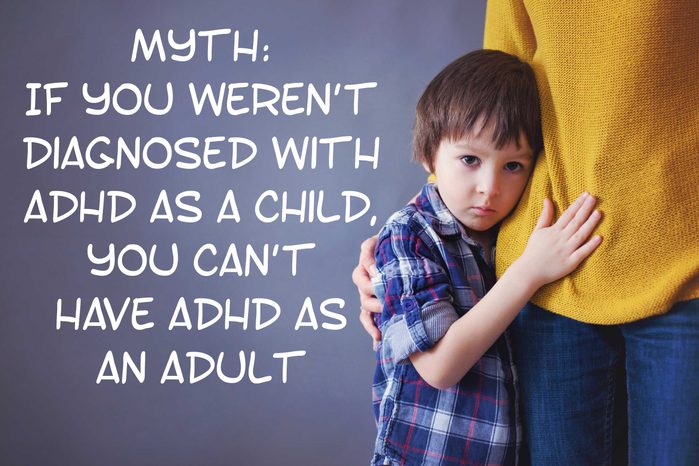
Myth: If you weren’t diagnosed with ADHD as a child, you can’t have ADHD as an adult
In fact, it’s just the opposite. Adult ADHD begins as childhood ADHD—and yet 75 percent of adults with ADHD were never diagnosed, Dr. Goodman explains. “This is not a disorder that ever goes away; if you have ADHD, you will likely always have ADHD,” he adds. That said, you may or may not be challenged by it depending on the demands of your environment. More often, however, the pressures and responsibilities of adulthood often exacerbate ADHD symptoms—including problems with concentration, focus, organization, and memory—leading adults to seek treatment for the first time. Also, since ADHD is genetic, parents who have children with ADHD may get help only after talking to the pediatrician about their kids’ ADHD symptoms, Dr. Goodman says. “It’s important to get the ADHD parent treated—it’s the parent that will show up late to teacher-parent conferences, drop the kid off late to school, or is unable to sit down and help with homework.”
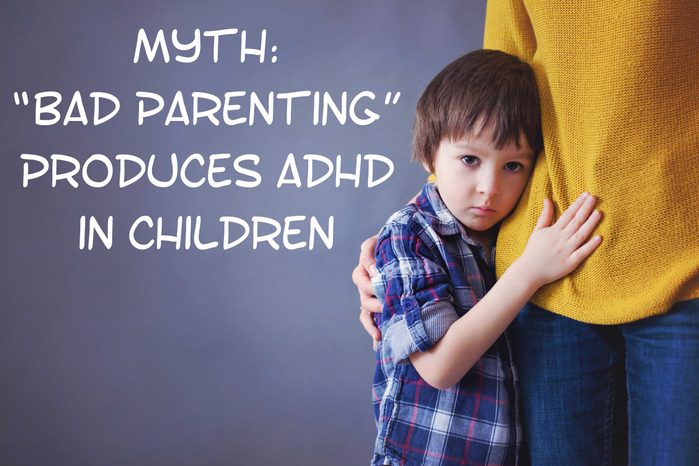
Myth: “Bad parenting” produces ADHD in children
Although the majority of research shows that ADHD is genetic, a growing body of science suggests that certain environmental factors may play a role, too. Fortunately, poor parenting isn’t one of them. “Even the worst parent can’t cause ADHD,” Dr. Goodman says. Kids with ADHD can’t control their impulses—and this is due to brain chemistry, not lack of discipline. In fact, according to the experts at ADDitude magazine, overly strict parenting (punishing a child for something he can’t control, for instance) can make ADHD symptoms worse. These are signs a high-energy toddler might have ADHD.
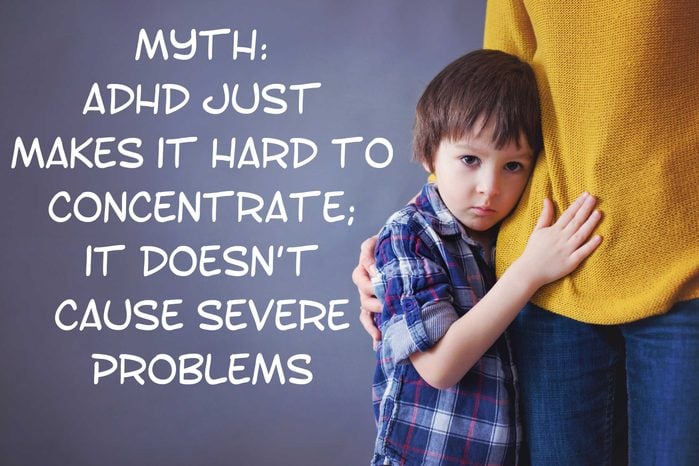
Myth: ADHD just makes it hard to concentrate; it doesn’t cause severe problems
“ADHD, especially if left untreated, causes mounting negative outcomes in people’s lives,” Dr. Goodman says. The disorder has been study-proven to impact a person’s self-esteem, mental health, education, social and family life, sexual behavior, driving ability, job performance, financial stability, and more. Children with ADHD who are not treated are also more likely to self medicate. And these troubles don’t disappear in adulthood. Without help, adults with ADHD are highly at risk for depression, anxiety, substance abuse, unemployment, divorce, and legal and financial struggles. The upside: ADHD treatment can help reduce the likelihood of these consequences.
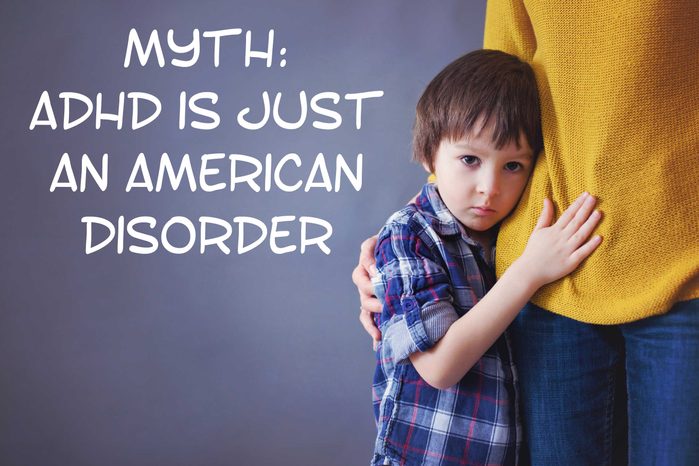
Myth: ADHD is just an American disorder
“There’s research done on ADHD around the world, in all of the continents, seen in broad ranges of cultural, political, economic, and social environments—and ADHD shows up regardless of any of those factors,” Dr. Goodman says. In fact, ADHD rates have surged worldwide —as much as tenfold in some countries, according to huffingtonpost.com. While many experts attribute the rise to improvements in the recognition, acceptance, and treatment of ADHD, others blame drug lobbyists, easy-to-access ADHD self-diagnostic Internet tools, and the adoption of the American-based DSM standards by more European and South American psychologists and psychiatrists.
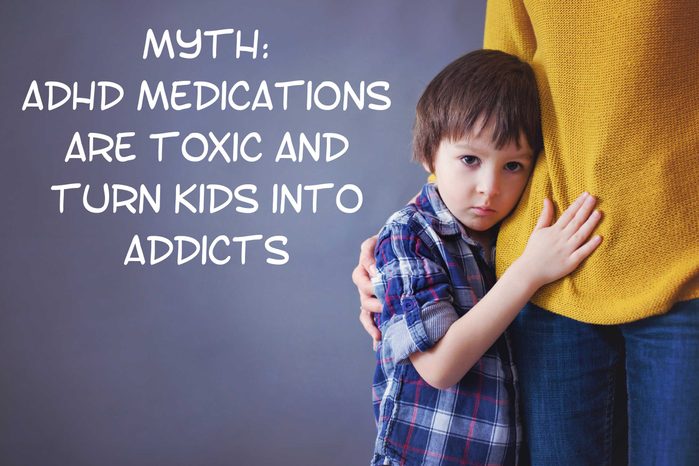
Myth: ADHD medications are toxic and turn kids into addicts
The most common type of medication used for treating attention deficit hyperactivity disorder (ADHD) is called a “stimulant”—and it’s classified as a controlled drug with the potential for abuse. The presumption, then, is that if you give adolescents stimulants they’ll be more likely to abuse other drugs. “This has been disproven quite strongly in several studies,” Dr. Goodman says. “In fact, if you don’t treat ADHD, you have a two to three higher likelihood of abusing drugs and alcohol.”
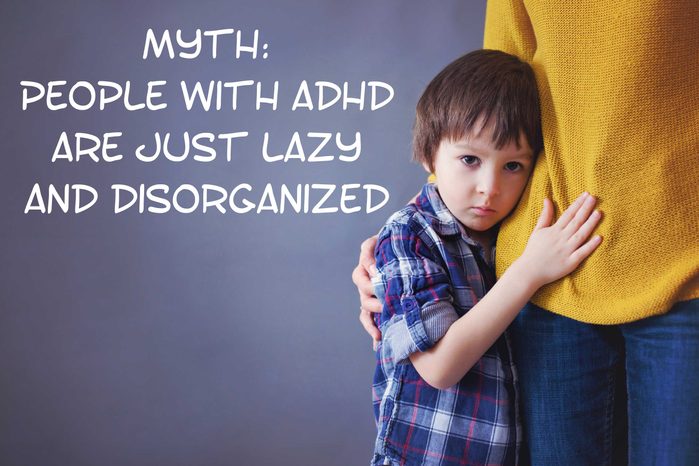
Myth: People with ADHD are just lazy and disorganized
Fellow ADDers Mozart, Benjamin Franklin, Abraham Lincoln, Bill Gates, John F. Kennedy, Virginia Woolf, and Salvador Dali would all have a good guffaw about this one! “There’s a difference between who you are and what you have,” Dr. Goodman says. “You are a person with certain talents and aptitudes and you have ADHD. In making that distinction, you separate the disorder from who you are and you help resurrect self-image.” Here are tips to get organized with ADHD.